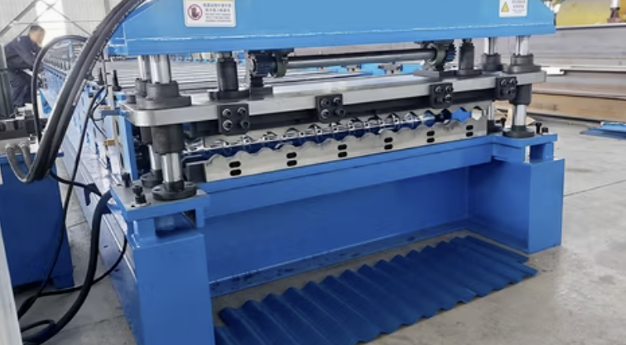
Posted on Saturday, November 16, 2024
Roll forming is a continuous bending process in which a long strip of metal, typically coiled steel, is passed through consecutive sets of rolls to form desired cross-sectional profiles. This method is renowned for its efficiency, precision, and versatility, making it integral to various industries.
Construction Industry
In Tunisia, the construction sector has been a significant adopter of roll forming technology. Roll forming machines are employed to produce components such as metal roofing panels, wall claddings, structural frames, and gutter systems. The ability to fabricate long, continuous lengths of metal profiles with consistent quality is particularly advantageous for large-scale building projects. The demand for roll-formed products in construction is driven by the need for durable, lightweight, and cost-effective building materials.
Automotive Industry
The automotive sector in Tunisia has experienced growth, with roll forming playing a crucial role in manufacturing various vehicle components. Parts such as bumpers, door frames, roof rails, and chassis components are produced using roll forming machines. This process allows for the creation of high-strength, lightweight parts that meet the stringent safety and performance standards of the automotive industry. The precision and efficiency of roll forming contribute to the sector's competitiveness and ability to meet both domestic and export demands.
Agricultural Industry
Tunisia's agricultural sector benefits from roll forming technology in the production of equipment and infrastructure. Roll-formed components are used in manufacturing machinery parts, storage silos, irrigation systems, and fencing. The durability and adaptability of roll-formed products make them suitable for the demanding conditions of agricultural applications. The use of roll forming in agriculture supports the sector's modernization efforts and enhances productivity.
Emerging Trends and Opportunities
The expansion of roll forming applications in Tunisia is influenced by several factors:
In summary, the roll forming industry in Tunisia is experiencing growth across multiple sectors, including construction, automotive, and agriculture. The versatility and efficiency of roll forming make it a valuable manufacturing process, supporting the country's industrial development and offering opportunities for innovation and expansion.

Used Purlin Roll Forming Machines for Sale Worldwide
Posted on Sunday, January 25, 2026
Pre-Owned Roll Forming Machines for Purlin & Structural Steel Profiles

Used Roof Panel Roll Forming Machines for Sale Worldwide
Posted on Sunday, January 25, 2026
Pre-Owned Roll Forming Machines for Roofing Panel Production

Used Roll Forming Machines for Sale Worldwide
Posted on Tuesday, January 20, 2026
Pre-Owned Roll Forming Machines with Inspection, Verification & Global Support

Steel Coil Supply for Roll Forming Machines Worldwide
Posted on Tuesday, January 20, 2026
Reliable Steel Coil Supply for Roll Forming, Fabrication & Manufacturing Applications
Copyright 2026 © Machine Matcher.